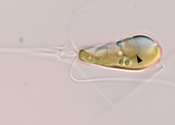Giant virus discovered in wastewater treatment plant infects deadly parasite
The single-celled organism Naegleria fowleri ranks among the deadliest human parasites. Researchers around Matthias Horn and Patrick Arthofer from the Center for Microbiology and Environmental Systems Science at the University ...









